| Srl | Item |
| 1 |
ID:
098654
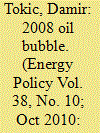

|
|
|
|
|
| Publication |
2010.
|
| Summary/Abstract |
We argue that "the 2008 Oil Bubble" was directly and indirectly created by the Federal Reserve in response to deflationary risks that resurfaced after the housing bubble burst and the resulting credit crisis of 2008. Deflationary risks first appeared after the dot.com bubble burst in 2000 and after the terrorist attacks on September 11, 2001. Manipulation of the US dollar value has been one of the key emergency tools in the Fed's arsenal. During the entire period from 2000 to 2008, the US dollar has been falling, while the price of crude oil has been rising, with the culmination in July 2008. If other global central banks embrace the Fed's anti-deflationary strategies, the consequences could be dire for the global economy, potentially resulting in an ultimate gold bubble.
|
|
|
|
|
|
|
|
|
|
|
|
|
|
|
|
| 2 |
ID:
067280
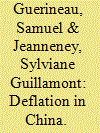

|
|
|
| 3 |
ID:
080869
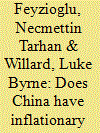

|
|
|
|
|
| Publication |
2008.
|
| Summary/Abstract |
With China's share in global trade increasing rapidly, some argued in 2002-2003 that China was exporting deflation to other countries as it was dumping cheap goods in mature markets. Later, others argued that China was causing sharp increases in global prices. This paper uses several econometric techniques to assess the extent of the link between inflation rates between China and the USA and Japan. Only limited empirical evidence at the aggregate level is found for consumer price inflation in China leading to price changes in the USA and Japan. However, there is some evidence that inflation in the USA has an impact on Chinese inflation. The results seem consistent with the Federal Reserve and the Bank of Japan being concerned about inflation and, hence, adjusting policy such that inflation shocks have no significant effect on overall inflation. Recent Chinese price rises are unlikely to have a material effect on the USA or Japan
|
|
|
|
|
|
|
|
|
|
|
|
|
|
|
|
| 4 |
ID:
029857
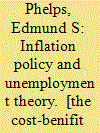

|
|
|
|
|
| Publication |
London, Macmillan Press Ltd., 1972.
|
| Description |
xxviii, 322p.
|
|
|
|
|
|
|
|
|
|
|
|
Copies: C:1/I:0,R:0,Q:0
Circulation
| Accession# | Call# | Current Location | Status | Policy | Location |
| 010897 | 332.41/PHE 010897 | Main | On Shelf | General | |
|
|
|
|
| 5 |
ID:
126845
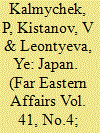

|
|
|
|
|
| Publication |
2013.
|
| Summary/Abstract |
The unstable situation in Japan's internal politics continued in 2012 and early 2013. Having come to power at the end of 2009, the Democratic Party was unable to keep its campaign promises and thus suffered defeat in the December 2012 parliamentary elections. The Liberal Democratic Party, once again in power, is also encountering a number of serious challenges in domestic and foreign politics. Prime Minister Shinzo Abe intends to bring the economy out of its prolonged stagnation, and to conduct a firm international policy that includes resolving territorial disputes with neighboring countries.
|
|
|
|
|
|
|
|
|
|
|
|
|
|
|
|
| 6 |
ID:
113904
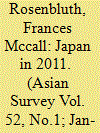

|
|
|
|
|
| Publication |
2012.
|
| Summary/Abstract |
Japan's government under the Democratic Party of Japan has limped along for another year, hampered by a divided legislature and an aging population reluctant to pay for the pensions and services it requires. The natural disasters of March 2011 were a tragic sideshow to the deep political problems that continue to plague Japan.
|
|
|
|
|
|
|
|
|
|
|
|
|
|
|
|
| 7 |
ID:
091778
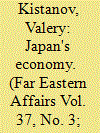

|
|
|
|
|
| Publication |
2009.
|
| Summary/Abstract |
The world financial crisis has struck Japan's economy more heavily than the economies of other countries. In order to emerge from the crisis the Japanese government put an emphasis on the Keynesian methods of regulation, which consist in pumping state financial means into the economy with a view to expanding domestic demand and eliminating disbalance between demand and supply.
|
|
|
|
|
|
|
|
|
|
|
|
|
|
|
|
| 8 |
ID:
133230
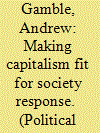

|
|
|
|
|
| Publication |
2014.
|
| Summary/Abstract |
In 2008 the neoliberal order was rocked to its foundations by the greatest financial crash since 1929. Five years on, however, we are still living in a neoliberal world. The basic structures of the neoliberal order are still in lace. Bankers still expect their bonuses, and chief executives still expect to be paid several hundred times the remuneration of their lowest paid employee. Deflation has replaced inflation as the new threat to prosperity, living standards are frozen or falling, and the economy can only be kept going by more 'privatised Keynesianism', boosting demand by increasing personal debt and borrowing
|
|
|
|
|
|
|
|
|
|
|
|
|
|
|
|